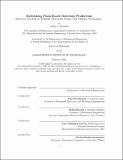Rethinking Plant-Based Materials Production: Selective Growth of Tunable Materials Using Cell Culture Techniques
Author(s)
Beckwith, Ashley L.
DownloadThesis PDF (122.7Mb)
Advisor
Velásquez-García, Luis Fernando
Terms of use
Metadata
Show full item recordAbstract
Each year, global forests shrink by billions of trees due to human activities and natural disasters. This sustained deforestation impacts both environment and economy. Forests are ecologically essential—supporting biodiversity, stabilizing ecosystems, and sequestering carbon. Trees also supply feedstock for building infrastructure, energy generation, production of consumer goods, textile manufacturing, and an increasing range of other economic activities. Biotechnology may hold the key to satisfying the growing demand for wood and wood-based products while staving off further deforestation and environmental disruption. This work explores the use of cell culture techniques to selectively generate plant-based materials without whole plant cultivation and harvest. The proposed approach allows for localized, high-density production, elimination of energy-intensive harvest and hauling, and reduced processing, while offering inherent climate resilience.
Employing a Zinnia elegans model system, this work provides the first proof-of-concept demonstrating net-shape, tunable plant material production in vitro. Central activities of the presented research include: (1) establishing knowledge to effectively direct cellular development, (2) devising and demonstrating mechanisms to direct material form, and (3) relating cellular-level properties to emergent material characteristics to allow tunable and predictable material outcomes.
First, using newly proposed metrics, cellular responses to applied culture conditions are quantified and mapped; selected environmental parameters including hormone concentration, medium pH, and cell density are shown to significantly influence cell differentiation and morphology.
Next, material form is directed through the casting and bioprinting of cell-laden hydrogel scaffolds. Gel-mediated culture enables plant material production both in forms and at scales that do not arise naturally in comparable whole plants. A maximum size for gel-based plant cultures has yet to be reached with prolonged cell viability maintained even at distances of more than 8.7 mm from the gel surface.
Finally, this work reports the first mechanical, physical, and microstructural characterization of 3-D printed, lab-grown plant materials and demonstrates material tunability with simple adjustments to culture conditions (e.g., hormone levels). Grown material properties vary significantly with hormone levels of the nutrient medium. The storage modulus of high-hormone samples presenting vascular cell types was elevated at 404.7 MPa ± 146.9 compared to low-hormone samples (P=0.033) with storage modulus measuring at 135.3 ± 57.4 MPa. Hormone levels also impacted growth potential and physical material properties. High hormone samples saw only moderate increases in sample volume and mass (91% and 31%, respectively) compared with larger gains in low hormone formulations (398% and 119%, respectively), relative to a cell-free control. An examination of material microstructure reveals distinct cellular morphologies and identities for the evaluated growth conditions.
This work demonstrates the feasibility, tunability, and scaling potential of net-shape plant material cultivation—presenting new uses for plant culture technology, establishing novel methods for quantification of culture growth and development, and providing a first characterization of cultured plant materials. More importantly, this proof-of-concept illustrates the promise of a customizable, land-free approach to generating plant materials—a decisive first step towards the vision of tree-free wood products.
Date issued
2022-02Department
Massachusetts Institute of Technology. Department of Mechanical EngineeringPublisher
Massachusetts Institute of Technology